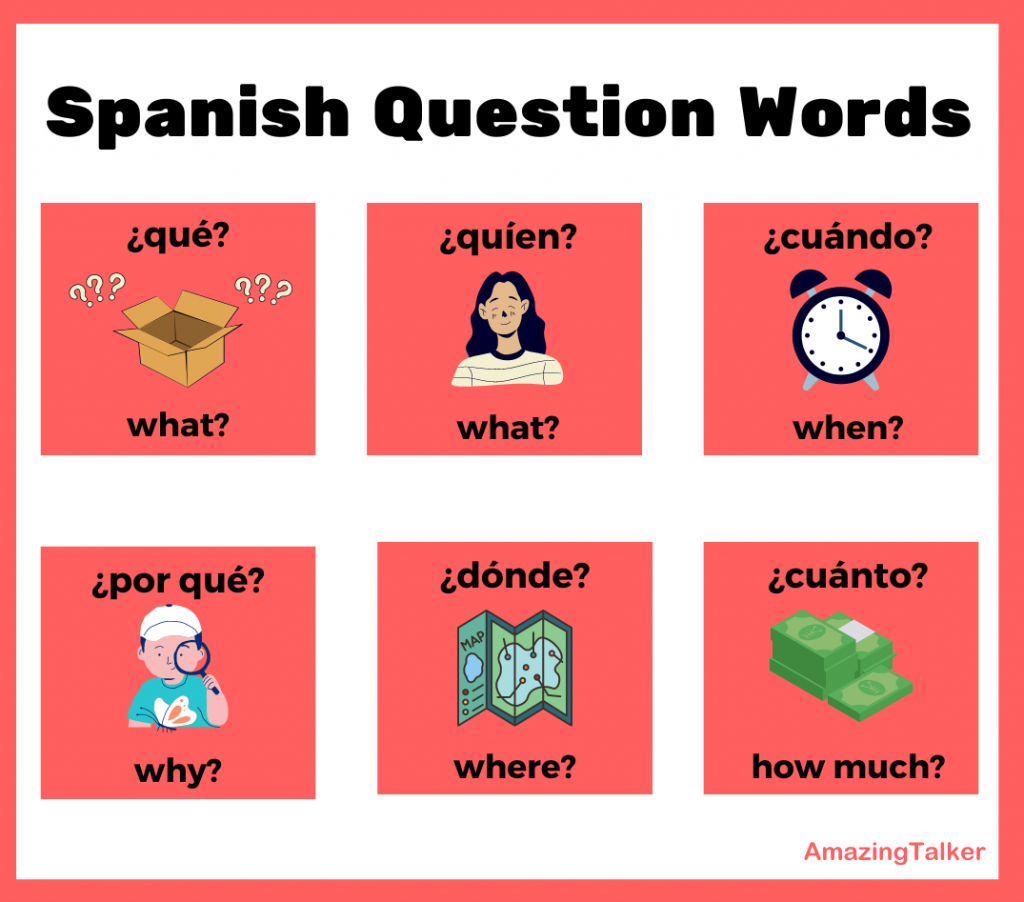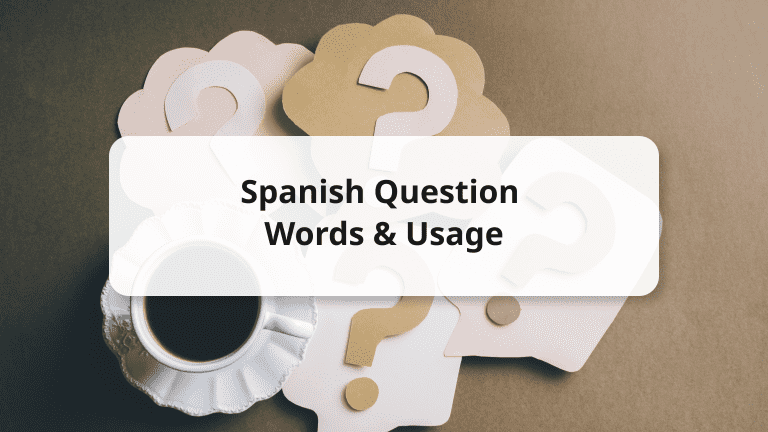Knowing what and how to use Spanish question words will not only boost your Spanish speaking proficiency but also make you more independent in conversation.
When starting on your Spanish learning journey, it’s important to learn Spanish words or phrases that can be used in everyday conversations. Such as asking ”how are you” in Spanish. Learning Spanish question words is one of the most important concepts— you must know the “¿Quién?, ¿Qué?, ¿Dónde? ¿Por qué? ¿Cuánto?” of the Spanish language! How else would you ask for directions?
In this article, we will guide you on what Spanish question words are and how you would use them!
Common Spanish Questions Words Table
Before we get into the thick of it, let’s first summarize the most common Spanish question words, so you can get a feel of it:
| Question | English |
|---|---|
| ¿Qué? | What? |
| ¿Quién? | Who? |
| ¿Cuándo? | When? |
| ¿Cómo? | How? |
| ¿Dónde? | Where? |
| ¿Cuál? | Which? |
| ¿Cuánto? | How much? |
| ¿Por qué? | Why? |
Common Spanish Questions Words
Now that you have a feel for Spanish question words, we will dive deeper into each one of them and discuss what the word means and how to use it with some examples to make things clearer!
Table of Contents
Toggle“What” in Spanish: ¿Qué?
The most common Spanish question word is ¿Qué?, which means “What?”. As in, what is this? What are you eating? What’s the time in Spanish?
The Spanish word Qué itself has a lot of meanings. To use it to ask “What?” in Spanish, the word must be used when the following word is a noun or any form of the verb ser.
So the sentence pattern would be
¿Qué + Noun + Additional information?
Example: “¿Qué hora es?” (What time is it?)
or
¿Qué + Ser (any variant) + Additional information?
Example: “¿Qué está haciendo?” (What is he doing?)
More example sentences:
-
¿Qué hay en el menú?
(What is on the menu?)
-
¿Qué vas a hacer el próximo mes?
(What will you be doing next month?)
-
¿Qué puedo hacer sobre esto?
(What can I do about this?)
“Who” in Spanish: ¿Quién?
The “who?” in Spanish, is another popular Spanish question word. The word must agree with the number of things that the sentence is referring to. The word form ¿Quién? is used when addressing one thing, ie, the singular form, and ¿Quiénes? is used to address a group of things, the plural form.
The sentence pattern would then be something like this:
¿Quién + Verb (singular) + Additional information?
Example: ¿Quien es esta? (Who is this)
or
¿Quiénes + Verb (plural) + Additional information?
Example: ¿Quienes son ellas/ellos? (Who are they?)
or
If you want to ask “Who’s” or “Whose” then you must use ¿De quién? (singular)/¿De quiénes? (plural)
Example: ¿De quién es este bolso? (Who’s bag is this?)
More example sentences:
-
¿Quién viene a la fiesta?
(Who is coming to the party?)
-
¿Quiénes son las bandas que tocan esta noche?
(Who are the bands playing tonight?)
-
¿De quién es este edificio?
(Whose building is this?)
Maybe learn how to say sorry in Spanish when you ask someone, who you’ve met before, who they are! So instead of ¿Quién eres tú? (Who are you?) you say ¿Disculpa quien eres? (Sorry, who are you?). Manners are important!
“When” in Spanish: ¿Cuándo?
The “When?” in Spanish. This word pairs nicely with birthday in Spanish, especially when you have to ask ¿Cuando es tu cumpleaños? (When is your birthday?).
The sentence pattern is:
¿Cuándo + Verb + Additional information?
Example: ¿Cuando vienes? (When are you coming?)
or
Sometimes the word does not go at the beginning of a sentence, but it still serves the same purpose.
Example: ¿Puedes decirme cuándo vienes? (Can you tell me when you are coming?)
More example sentences:
-
¿Cuándo iremos a comer?
(When are we going to eat?)
-
¿Cuándo es el evento?
(When is the event?)
-
¿Puedes decirle a Chris cuándo es la fiesta?
(Can you tell Chris when the party is?)
“How” in Spanish: ¿Cómo?
The question word “How?” is ¿Cómo? in Spanish.
The sentence pattern is:
¿Cómo + Verb + Additional information?
The most common example of this Spanish question word is ¿Cómo estás?
Depending on the context of the sentence, ¿Cómo? could mean “what” instead or “How?”
Example: ¿Cómo se llama? (What is her name?)
More example sentences:
-
¿Cómo está tu mamá?
(How is your mom doing?)
-
¿Como está el clima?
(How is the weather?)
-
¿Cómo esta la feria?
(How is this fair?)
“Where” in Spanish: ¿Dónde?
The question of “where?” is ¿Dónde? in Spanish. A rather helpful word for when you need to get directions and avoid getting completely lost.
The sentence pattern to use the word is:
¿Dónde + Verb + Additional information?
Example: ¿Donde esta ella? (Where is she?)
This Spanish question word has variants, namely:
- “¿Adónde?”, which means “To where?”. Example: ¿Adónde te gustaría it? (Where would you like to go to?)
- “¿De Dónde?” which “From where?”. Example: *¿*De dónde es él? (Where is he from?)
More example sentences:
-
¿Adónde vamos?
(Where are we going?)
-
¿Dónde está mi lapicero?
(Where is my pen?)
-
¿De dónde es este paquete?
(From where is this package?)
“Which” in Spanish: ¿Cúal?
The Spanish question word ¿Cúal? means “Which?”. This is usually used when you have to choose between two things. While is the singular form of the word, ¿Cuáles? is the plural.
The sentence pattern to use the word is:
¿Cúal + Verb (singular) + Additional information?
Example: ¿Cuál color debo elegir? (Which color should I choose?)
¿Cúales + Verb (plural) + Additional information?
Example: ¿Cuáles de estos libros tienes? (Which one of these books do you have?)
More example sentences:
-
¿Cuál debo tomar?
(Which one should I take?)
-
¿Cuál de estos documentos debo leer?
(Which one of these documents should I read?)
-
¿Cuál es?
(Which one is it?)
“How much” in Spanish: ¿Cúanto?
A frequently used phrase when browsing the local street markets, ¿Cúanto? or “How much?” or “How many?”.
The word has many forms depending on the subject:
-
¿Cúanto? is for a singular masculine subject and means “How much?”, so the sentence pattern would be:
¿Cúanto + Verb (singular) + Singular masculine subject?
Example: ¿Cuánto cuesta el libro? (How much is the book?)
-
¿Cuántos? is used for a plural masculine subject and means “How many?”.
¿Cúantos + Verb (Plural) + Plural masculine subject?
¿Cuántos niños participaran en el show? (How many kids will participate in the show?)
-
¿Cuánta? is for a singular female subject and it means “How much?”.
¿Cúanta + Verb +Singular female subject?
Example: ¿Cuánta azúcar necesitas? (How much sugar do you need?)
-
¿Cuántas? is for a plural feminine subject and it means “How many?”.
¿Cúantas + Verb +Plural female subject?
Example: ¿Cuántas mesas necesitamos? (How many tables do we need?).
More example sentences:
-
¿Cuánto cuestan las manzanas?
(How much are the apples?)
-
¿Cuántas distinciones obtuvo?
(How many distinctions did she get?)
-
¿Cuántos animales hay?
(How many animals are there?)
“Why” in Spanish: ¿Por Qué?
“Why” in Spanish is called ¿Por Qué? and has a sentence pattern of:
¿Por Qué + Verb + Additional information?
There are two forms of this word:
-
¿Por qué? means to question a cause.
Example: ¿Por qué hiciste eso? (Why did you do that?)
-
¿Para qué? is to question a purpose, a “What for?”.
Example: ¿Para qué hiciste eso? (What did you do that for?)
More example sentences:
-
¿Por qué estás aquí?
(Why are you here?)
-
¿Para qué son las sillas?
(What are the chairs for?)
-
¿Por qué no presentaste tu informe?
(Why didn’t you turn your report in?)

More Ways to Form a Spanish Question Words
There are more ways to ask questions in Spanish without using the Spanish question words that we discussed above:
1. Suggestion Questions in Spanish
Similar to the English language, in Spanish, you can ask questions that aren’t actually a question but more a suggestion.
For example, your friend is complaining that they can’t get enough work done during the day, you then reply with: “¿Por qué no te levantas más temprano?” (Why don’t you wake up earlier?)
Example sentences:
-
¿Por qué no usas un lápiz en vez?
(Why don’t you use a pencil instead?)
-
¿Por qué no hablas con ella?
(Why don’t you just talk to her?)
-
¿Por qué no tomas el autobús?
(Why not take the bus?)
2. Rhetorical Questions in Spanish
You can ask rhetorical questions in Spanish, which are questions that you ask but you already know the answer to or don’t need.
For example, your friend asks you when your birthday is, and you reply with: “¿Cómo es que no sabias que hoy era mi cumpleaños? Te avise ayer.” (What do you mean you don’t know my birthday is today? I told you yesterday).
Yikes, hopefully your friend just struggles to remember months in Spanish, rather than forgetting your actual birthday!

Difference Between English & Spanish Question Words
No language is entirely the same. The same goes for asking questions in English versus Spanish:
1. Pronouns aren’t needed
When you ask a question in Spanish, you don’t need to add pronouns (you, she, he, they, them, etc). For example, in English, you ask “Did you take my book?” whereas in Spanish you ask “¿Te llevaste mi libro?”, when directly translated from English it’s “Did take my book?”, the pronoun “you” is omitted.
Another example would be “Are they in class?”, in Spanish it would be “¿Están en clase?”, “Are in class?”, the pronoun “they” is omitted.
2. Double Question Mark
When asking a question in English, you only need to present the “?” (question mark) once in a sentence, such as “How are you?”. In Spanish however, you present the question mark twice; one at the beginning (it looks like “¿” this) and then one at the end, so it would be “¿Cómo estas?” (How are you?).
3. No Auxiliary Verbs
In addition to omitting the pronouns, when asking a question in Spanish, you also omit the auxiliary verbs. Auxiliary verbs are used to set the main verb’s tense, mood, or voice. Examples of auxiliary verbs are am, is, are, was, were, will, have, has, had, etc
For example, instead of saying “Will he come?” in English, in Spanish, you say ¿El vendra? (He come?) and omit the “will”. Another example is instead of saying “Is she available?” you say ¿Está disponible? (she available?) in Spanish.
Note that the pronoun is also omitted, as per the above rule.
4. Questions Have Accents
In the Spanish language, questions need to have accents or else the meaning changes, as in, the sentence won’t be a question anymore!
For example, we have mentioned that Que has a lot of meanings and it has to do with accents: the word Que alone means “that”, “which” or “who”, when you add an accent to form Qué, the meaning changes to “What” or “How”.
For example:
¿Qué cenaremos hoy? (What are we having for dinner today?)
Alejandra dice que no quiere ir a visitar a sus abuelos. (Alejandra is saying that she doesn’t want to go visit her grandparents. )
Spanish Question Words Quiz!

I hope you have been paying attention because it is quiz time! Below is a set of 10 questions for you to answer. Go on, see if you understand Spanish question words!
- ¿ _____ llegó a casa? (How did he get home?)
- ¿ _____color de camisa debo usar? (Which color shirt should I wear?)
- ¿ _____ tipo de sándwich quieres? (What type of sandwich do you want?)
- ¿ _____ no le preguntas a la profesora? (Why don’t you ask the teacher?)
- ¿ _____ es él? (Who is he?)
- ¿ _____ es el nombre del restaurante? (What is the name of the restaurant?)
- ¿ _____ está? (Where is it?)
- ¿ _____ es tu cumpleaños? (When is your birthday?)
- ¿ _____ se esconde? (Where is she hiding?)
- ¿ _____ es nuestra entrenadora? (Who is our coach?)
Good luck! The answers are located below.

¿Qué tan bien entiendes las palabras interrogativas en español? (How well do you understand Spanish question words?)
Being able to ask questions in the language you are trying to speak is very important. Luckily with Spanish question words, it’s rather simple!
Sometimes you just don’t really understand a certain topic when learning a new language, which is okay! Getting help is the best course to take in this case, either by learning some new tactic to study the language, such as tips to learn Spanish fast, or by getting an online tutor. At AmazingTalker, we are equipped with professional online tutors that will help you reach your learning goals and guide you through those pesky topics that you just don’t quite understand. All of this and more, at AmazingTalker!
Answers to the quiz:
How did you do?
- ¿Cómo llegó a casa? (How did he get home?)
- ¿Qué color de camisa debo usar? (Which color shirt should I wear?)
- ¿Qué tipo de sándwich quieres? (What type of sandwich do you want?)
- ¿Por qué no le preguntas a la profesora? (Why don’t you ask the teacher?)
- ¿Quién es él? (Who is he?)
- ¿Cuál es el nombre del restaurante? (What is the name of the restaurant?)
- ¿Dónde está? (Where is it?)
- ¿Cuando es tu cumpleaños? (When is your birthday?)
- ¿Dónde se esconde? (Where is she hiding?)
- ¿Quién es nuestra entrenadora? (Who is our coach?)
















